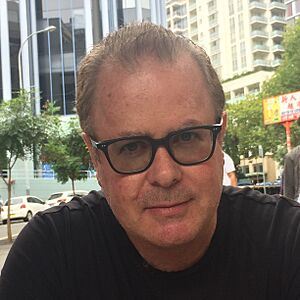David Macarthur facts for kids
Quick facts for kids
David Macarthur
|
|
|---|---|
 |
|
| Education | Harvard University (PhD), University of Sydney (BA, 1st-class Hons) |
| Era | 21st-century philosophy |
| Region | Western philosophy |
| School | Analytic (training), Postanalytic Philosophy, Pragmatism, Skepticism |
| Institutions | University of Sydney |
| Thesis | Skeptical Reason and Inner Experience: A Re-examination of the Problem of the External World (1999) |
| Doctoral advisor | Stanley Cavell, Hilary Putnam, Warren Goldfarb |
|
Main interests
|
skepticism, metaphysical quietism, pragmatism, naturalism, philosophy of art |
|
Notable ideas
|
metaphysical quietism, liberal naturalism, an imaginative relational view of art |
David Macarthur is an Australian philosopher. He is a Professor of Philosophy at the University of Sydney. He studies big questions about how we know things, what reality is, and what art means.
Professor Macarthur explores ideas like skepticism, which is about questioning what we think we know. He also looks at pragmatism, a way of thinking that focuses on practical results. His work also covers naturalism, which is about understanding the world through natural laws. He is especially interested in the philosophy of art, including film, photography, and buildings.
Contents
Education and Career
David Macarthur first studied medicine at the University of Sydney. He earned his medical degree in 1988. Then, he completed an arts degree in 1991. He received top honors for his arts degree.
He later earned a Ph.D. in philosophy from Harvard University in 1999. His main teachers there were Stanley Cavell, Hilary Putnam, and Warren Goldfarb. His Ph.D. paper was about skepticism and how we experience the world. After Harvard, he taught at Tufts University for a year. He then worked as a researcher at Macquarie University until 2003. Since 2003, he has been a professor at the University of Sydney.
Liberal Naturalism
Professor Macarthur, along with Mario De Caro, helped create a new idea called liberal naturalism. This idea is a different way to understand the world. It is an alternative to the common scientific naturalism.
Liberal naturalism suggests that we can understand the world in many ways. It is not just through science. It values other forms of understanding, like how we think about people, language, and art. This idea tries to bring together scientific views with everyday experiences. It helps us understand how different parts of our world connect.
Philosophy of Art
In the area of art, Professor Macarthur has special ideas. He believes that artworks do not have just one fixed meaning. Instead, he thinks art is meaningful in a different way.
He calls his idea the "imaginative relational view of art." This means art does not tell us what to think. Instead, art suggests or hints at ideas. It lets us imagine and connect with it in our own ways.
Books
Edited Collections
Professor Macarthur has helped edit several books. These books bring together different ideas from many philosophers.
- Macarthur, David and De Caro, Mario (Eds.) (2022). The Routledge Handbook of Liberal Naturalism. This book explores the idea of liberal naturalism.
- Macarthur, David and Hetherington, Stephen (Eds.) (2022). Living Skepticism. This book looks at how skepticism affects our lives.
- Macarthur, David and De Caro, Mario (Eds.) (2022). Philosophy as Dialogue: Hilary Putnam. This book is about the ideas of philosopher Hilary Putnam.
- Macarthur, David (Ed.) (2017). Hilary Putnam & Ruth Anna Putnam, Pragmatism as a Way of Life: The Lasting Legacy of William James and John Dewey. This book discusses pragmatism and its impact.
- Macarthur, David and De Caro, Mario (Eds.) (2012). Hilary Putnam: Philosophy in an Age of Science: Physics, Mathematics and Skepticism. Another book focusing on Hilary Putnam's thoughts.
- Macarthur, David and De Caro, Mario (Eds.) (2010). Naturalism and Normativity. This book explores naturalism and rules for behavior.
- Macarthur, David and De Caro, Mario (Eds.) (2004). Naturalism in Question. This book questions different aspects of naturalism.
Articles (selected)
Professor Macarthur has also written many articles. These articles are published in philosophy journals and books.
- Macarthur, David (2020) “Rorty and (the End of) Metaphysics (?).” This article discusses the ideas of philosopher Richard Rorty.
- Macarthur, David (2019) “Difficulties of Reality, Skepticism and Moral Community: Remarks after Diamond on Cavell.” This article explores skepticism and community.
- Macarthur, David (2017) “Wittgenstein on Art.” This article looks at what philosopher Ludwig Wittgenstein thought about art.
- Macarthur, David (2017) “A Vision of Blindness: Bladerunner and Moral Redemption.” This article discusses the movie Bladerunner and its moral themes.
- Macarthur, David (2016) “Metaphysical Quietism and Everyday Life.” This article connects big philosophical ideas to daily life.
- Macarthur, David (2014) “Subject Naturalism, Scientism and the Problem of Linguistic Meaning: Critical Remarks on Price’s ‘Naturalism without Representationalism’.” This article discusses naturalism and language.
- Macarthur, David (2014) “Cavell on Skepticism & the Importance of Not-Knowing”. This article explores skepticism and the idea of not knowing everything.
- Macarthur, David (2010) “Taking the Human Sciences Seriously.” This article is about the importance of studying human behavior.
- Macarthur, David (2008) “Pragmatism, Metaphysical Quietism and the Problem of Normativity,” This article discusses pragmatism and rules.
- Macarthur, David & Price, Huw (2007) “Pragmatism, Quasi-realism and the Global Challenge.” This article looks at pragmatism and reality.
- Macarthur, David (2003) “McDowell, Skepticism and the ‘Veil of Perception,” This article discusses skepticism and how we see the world.
 | William L. Dawson |
 | W. E. B. Du Bois |
 | Harry Belafonte |

